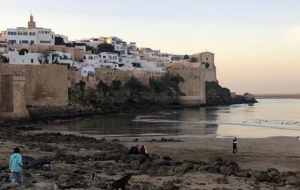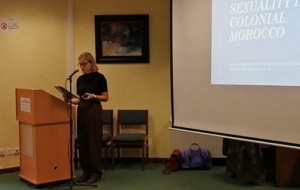Language training and research in Rabat
 Keasby Travel Grant Report – Catherine Phipps
Keasby Travel Grant Report – Catherine Phipps
Thanks to the Keasbey travel grant, I was able to go to Morocco in August 2021. For the past few months, I’ve been living in Rabat, the capital city. As a doctoral student in History, my research looks at gender and sexuality during the French protectorate in Morocco. I have been here conducting research at the Archives du Rabat, using rare texts at the National Library, and steadily learning Arabic at a local language school.
Rabat is on the Atlantic coast and joined to another small city, Salé, across the river, like Buda and Pest in Hungary. I live next to the medina, the traditional old town with winding streets surrounded by large stone walls. It is punctuated by the sounds of cocks crowing, motor bikes roaring and the call to prayer. The souk is a couple of minutes walk away, where you can buy fish, spices and olives.
 Every weekday I sit down and try to have a conversation in Moroccan Arabic with my poor teacher (her daily suffering has kindly been funded by the Keasbey travel grant). At the beginning of the semester, in September, there were about 10 of us. All girls, which means I have real problems conjugating any Arabic words to use the masculine endings, I happened to be joined by a group of language students from St Andrews on their semester abroad. But the group slowly to thinned out to just me as the semester progressed and we kept having to plod through ways to pronounce words that sound almost the same. Moroccan Arabic, darija, takes lots of its vocabulary from traditional Arabic, as well as from French. Cheese is “fromaj”, for example. But it also has plenty of different letters that sound almost unintelligible to English-speakers, yet completely different to Arabic speakers. I keep trying to tell people that “I study darija”, but it unfortunately comes out as “I hate darija” because of my inability to say the right “ah” sound and get my “k”s right.
Every weekday I sit down and try to have a conversation in Moroccan Arabic with my poor teacher (her daily suffering has kindly been funded by the Keasbey travel grant). At the beginning of the semester, in September, there were about 10 of us. All girls, which means I have real problems conjugating any Arabic words to use the masculine endings, I happened to be joined by a group of language students from St Andrews on their semester abroad. But the group slowly to thinned out to just me as the semester progressed and we kept having to plod through ways to pronounce words that sound almost the same. Moroccan Arabic, darija, takes lots of its vocabulary from traditional Arabic, as well as from French. Cheese is “fromaj”, for example. But it also has plenty of different letters that sound almost unintelligible to English-speakers, yet completely different to Arabic speakers. I keep trying to tell people that “I study darija”, but it unfortunately comes out as “I hate darija” because of my inability to say the right “ah” sound and get my “k”s right.
I have an hour of Moroccan Arabic and an hour of Modern Standard Arabic, a private one-on-one class every weekday. Modern Standard Arabic is horribly difficult, piles of grammar and conjugations. My Arabic letters are large and clumsy, like a child has written them. Darija, on the other hand, is a mainly spoken language and every Moroccan I speak to is delighted that greet them and ask how they are. I can say just four words, and everyone starts telling me how well I speak it, which I know is untrue but does wonders for my ego.
 At the same time as studying, I’m doing research for my doctoral thesis and am involved in a project looking at the history of migration to Morocco with an anthropologist at Al Akhawayn University, an English-language university in Ifrane in the Middle Atlas mountains. I was invited to go there in October 2021 to give my first ever lecture, talking about gender, sexuality and colonialism in Moroccan history. It was a great success! I’ve also been able to go to meet other sociologists and histories that work on Moroccan sexuality, which has been hugely informative and greatly improved my work. I’ve also been able to get my hands on some of the books I’ve spent two years trying to access, because of coronavirus restrictions to libraries, and have been slowly slogging away in the archives.
At the same time as studying, I’m doing research for my doctoral thesis and am involved in a project looking at the history of migration to Morocco with an anthropologist at Al Akhawayn University, an English-language university in Ifrane in the Middle Atlas mountains. I was invited to go there in October 2021 to give my first ever lecture, talking about gender, sexuality and colonialism in Moroccan history. It was a great success! I’ve also been able to go to meet other sociologists and histories that work on Moroccan sexuality, which has been hugely informative and greatly improved my work. I’ve also been able to get my hands on some of the books I’ve spent two years trying to access, because of coronavirus restrictions to libraries, and have been slowly slogging away in the archives.
I’ve been here for five months, and plan to stay for three more. Every day my language skills and research improve. I am incredibly grateful to the Keasbey travel grant for that.
Find out more about the range of travel grants and scholarships available to assist Univ students on our Travel Grants page or read further travel reports.
Published: 22 March 2022
